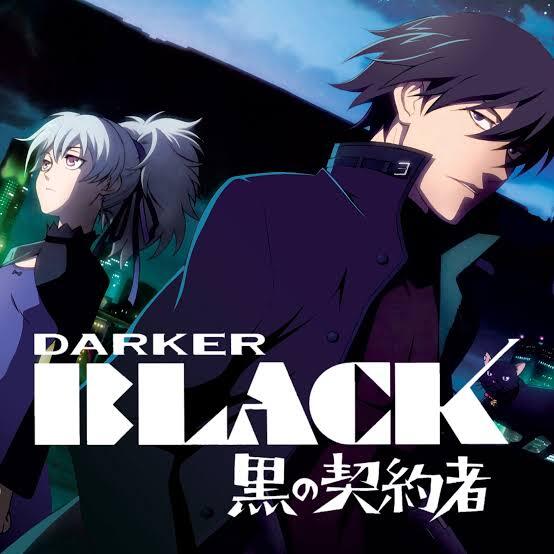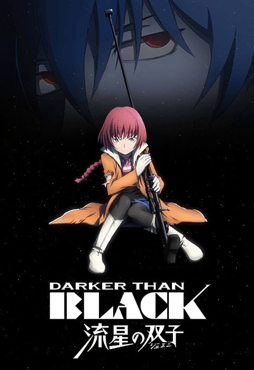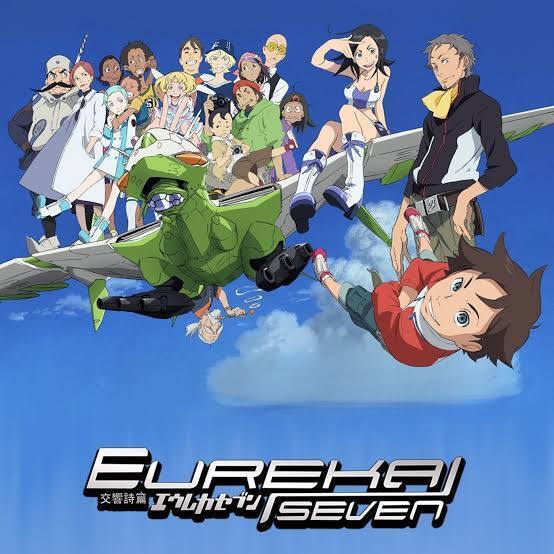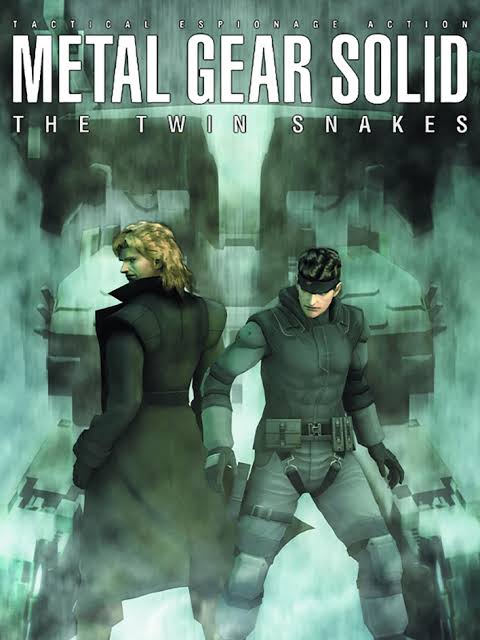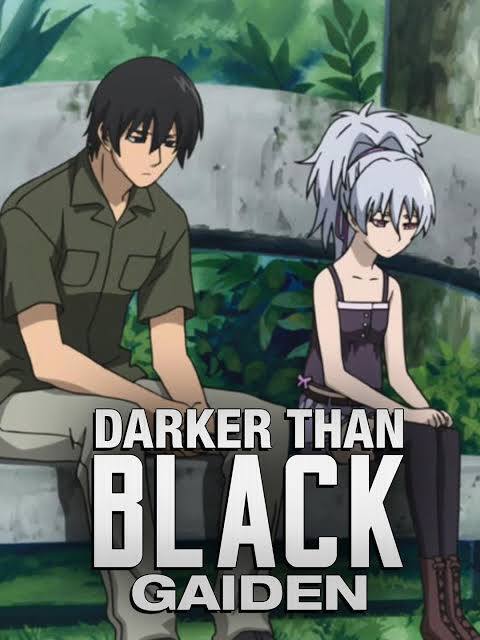Alchemist: Brotherhood stands as a monumental achievement in anime, praised worldwide for its perfect blend of gripping story, profound philosophical ideas, and layered character development. Released from 2009 to 2010, it’s a faithful adaptation of Hiromu Arakawa’s manga, delivering an experience as satisfying as it is intense. Unlike its predecessor, Fullmetal Alchemist (2003), which diverges from the manga’s original plot, Brotherhood follows Arakawa’s vision to the letter, creating a story that is as hauntingly powerful as it is emotionally resonant.
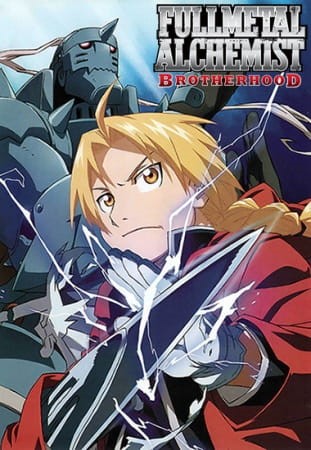
Though both series share the same core characters and themes, their art styles and atmospheres diverge greatly. Brotherhood boasts vibrant, polished visuals with a more modern, dynamic animation style. Studio Bones makes the most of advanced digital techniques, allowing battles to explode with life and characters to express emotions in stunning detail, creating a fully immersive experience. By contrast, the 2003 adaptation favors a darker aesthetic with a subdued color palette, evoking a grimmer, more nostalgic feel. Fans of classic anime appreciate this older series for its traditional animation style and unique tone. Together, these adaptations offer two distinct perspectives on the same story: Brotherhood with its visual fidelity to Arakawa’s art and fluid action sequences, and the 2003 version with its timeless, haunting atmosphere.
The story of Fullmetal Alchemist: Brotherhood begins with a tragic act of desperation. The young Elric brothers—Edward and Alphonse—commit the ultimate taboo in alchemy by trying to resurrect their mother. However, this forbidden act has disastrous consequences. They are teleported to a metaphysical realm where they encounter “The Truth,” a powerful, godlike being who exacts a heavy price for their trespass into the divine. Edward loses his left leg, and Alphonse loses his entire body. In a desperate bid to save his brother, Edward sacrifices his right arm to bind Alphonse’s soul to an empty suit of armor. Now, Edward is left with only one arm and leg, while Alphonse exists only as a soul tethered to cold, lifeless metal.
Despite their loss, the brothers refuse to give up hope. Edward acquires mechanical prosthetics, called “automail,” to replace his missing limbs, and together, they set out on a quest to restore their original bodies. Their goal centers on finding the legendary Philosopher’s Stone, a mythical artifact said to amplify an alchemist’s power and, potentially, grant immortality. With this stone, they might reverse the tragic consequences of their mistake—but at what cost?
A central theme of the series is the alchemical principle known as “Equivalent Exchange,” a law that states, “In order to obtain, something of equal value must be lost.” The brothers learned this law the hard way. What could possibly be equivalent to a human soul, to the love of a mother? Their attempt to play god left them scarred and broken, and now they seek to right their wrong. Yet, as their journey unfolds, the stakes grow higher, and they must continually ask themselves how much more they are willing to sacrifice in the pursuit of redemption.
This mysterious being, “The Truth,” leaves Edward not only with physical loss but also with an extraordinary gift: a vast amount of alchemical knowledge that it pours directly into his mind. This gift allows Edward to perform complex alchemy without a transmutation circle, a skill that sets him apart from most other alchemists. Determined to master his newfound abilities, Edward decides to join the military as a state alchemist. This position grants him access to military resources, including the extensive library he hopes will contain clues about the Philosopher’s Stone.
Along the way, Edward and Alphonse meet Roy Mustang, a powerful state alchemist with connections to their estranged father, Van Hohenheim. Roy sees great potential in the young brothers but cautions them to keep their secret safe. The practice of human transmutation is forbidden, and most who attempt it do not survive the rebound. Despite this, Edward becomes the country’s youngest state alchemist at the age of twelve. Armed with knowledge, determination, and a will hardened by loss, he and Alphonse begin their journey across Amestris, uncovering leads on the Philosopher’s Stone. But the brothers soon discover they aren’t alone in their search. Others, with far darker intentions, also seek the stone, pulling the Elrics into a vast, dangerous conspiracy that could shake the foundations of their world.
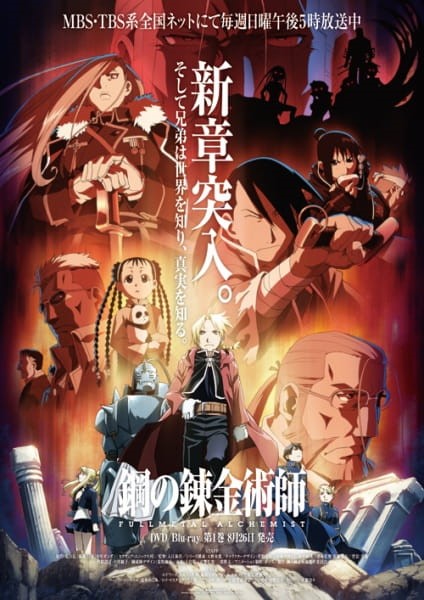
As they journey through Amestris, the brothers encounter a complex web of characters, each with their own motivations, strengths, and flaws. These characters range from loyal friends and allies to menacing foes and morally ambiguous figures who challenge the brothers’ beliefs and push them to confront difficult truths about their mission and themselves. The Elrics’ journey is as much an internal struggle as it is a physical one; each interaction forces them to reevaluate their values, question their loyalty to one another, and ponder the meaning of sacrifice.
The series is a stunning example of visual and narrative craftsmanship. Studio Bones brings Arakawa’s world to life with impeccable detail, blending animation and story into a seamless whole. Fight scenes are thrilling, often combining jaw-dropping choreography with intense emotional stakes. The art is richly detailed, capturing the gritty landscapes of Amestris and the vibrant nuances of its characters. The soundtrack, composed by Akira Senju, heightens the experience with powerful orchestral arrangements that underscore key moments, from tense battles to heart-wrenching scenes of loss and reconciliation. Every element, from voice acting to sound design, contributes to an immersive world that pulls viewers in and holds them spellbound.
In the end, Fullmetal Alchemist: Brotherhood is much more than an anime about alchemy. It’s a story about resilience, the relentless pursuit of truth, and the lengths we go to for those we love. The Elric brothers’ journey is a profound meditation on the nature of sacrifice and the power of hope. It’s a series that challenges us to think deeply about what it means to be human, to face the consequences of our actions, and to find strength in the face of overwhelming odds. This masterpiece remains a timeless tale that continues to resonate with audiences around the world, an unforgettable journey of courage, love, and redemption.

